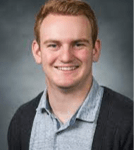Winter 2025
Fraser Lecture Series Event: Then I Am Myself the World Mystical, Near-Death, and Other Transformative Experiences
Date: Friday, February 28th from 6:00pm-7:00pm
Location: PAC Mainstage or Zoom (Free event but registration required)

Speaker: Christof Koch, PhD
Featuring: Christof Koch is a neuroscientist best known for his studies and writings exploring the basis of consciousness, starting with the molecular biologist Francis Crick. Trained as a physicist, Christof was a professor of biology and engineering at the California Institute of Technology and the Chief Scientist and then President of the Allen Institute for Brain Science in Seattle. He is now Meritorious Investigator at the Allen Institute and the Chief Scientist of the Tiny Blue Dot Foundation, with its focus on understanding consciousness, and how this knowledge can benefit humanity. His latest book is Then I Am Myself the World.
Description: Transformative Experiences, including religious conversion, mystical, aesthetic, near-death, and psychedelic experiences, are brief, rare, and unexpected events that can lead to permanent changes in the attitudes, goals, beliefs, and habits of the individual that underwent this experience, including loss of fear of death and radical changes in worldview. Please plan to join WWU faculty, staff, students, alumni, and the Bellingham community on campus or virtually for a special lecture by Dr. Koch related to his recent book on the science of consciousness, “Then I Am Myself the World”.
AA/EO—For disability accommodations, please call 360-650-2148 or email BNS@wwu.edu
Fall 2024
Joint Seminar Speaker hosted by the Behavioral Neuroscience Program and Biology Department
Date: Wednesday, November 20th from 4:00pm-5:00pm
Location: BI 234
Speaker: Brian Daniels, PhD / Rutgers University
Fall 2024
Seminar Speaker hosted by the Behavioral Neuroscience Program
Date: Tuesday, November 5th from 4:00pm-5:00pm
Location: AW 204
Speaker: Amanda Richards is a 3rd year Neuroscience PhD Candidate at Washington State University.
Talk Title: Unraveling the Neurobiology of Cannabis Use Disorder: Insights and Implications
Fall 2024
Seminar Speaker hosted by the Behavioral Neuroscience Program
Date: Tuesday, October 22nd from 4:00pm-5:00pm
Location: AW 204
Speaker: Monica Tschang is a 3rd year Neuroscience PhD Candidate at the University of Washington in the Schindler Iterative Translation Lab under Dr. Abigail Schindler.
Talk title: Gut Feelings: how psychiatric symptoms can arise from a traumatized gut microbiome.
Spring 2024
Joint Seminar Speaker hosted by the Behavioral Neuroscience Program and Chemistry Department
Date: Friday, May 31st from 3:15-4:15pm
Location: TBD
Speaker: Kimberly M. Alonge, PhD, Program Director for Matrix Biology in the Medicine Diabetes Institute and Assistant Professor at University of Washington Dept of Medicinal Chemistry
Spring 2024
Behavioral Neuroscience Program Seminar Speaker
Date: Thursday, May 1st from 4-5pm
Location: AW 210
Speaker: Tamer M. Gamal El-Din, Ph.D., Department of Pharmacology at University of Washington
Winter 2024
The Behavioral Neuroscience Program and Finance and Marketing Department Joint
Seminar Speaker on Thursday, March 7th from 4-5pm in AW 210. Including student
meet n’ greet before the talk.
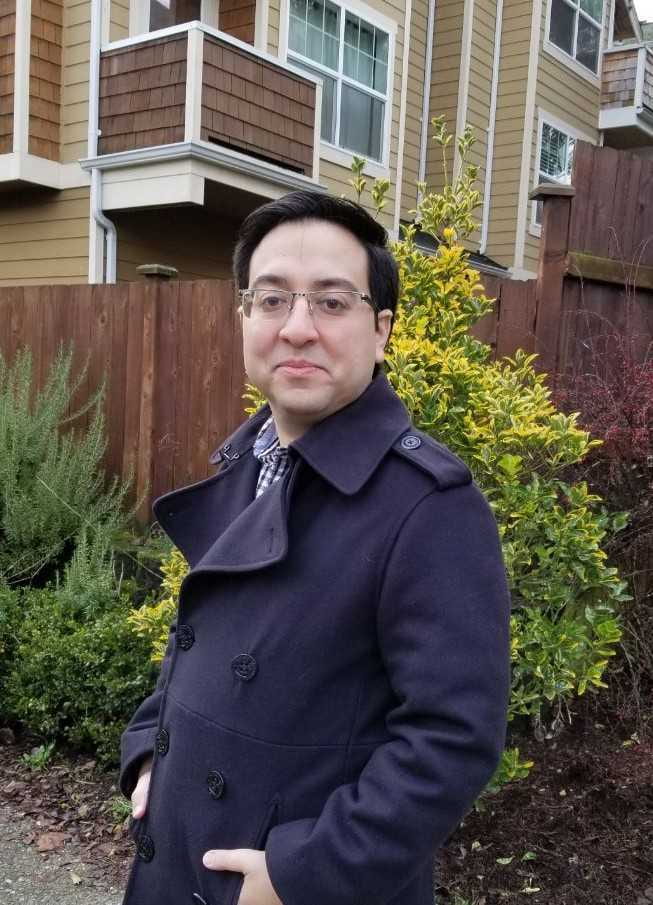
Speaker: Koosha Khalvati, PhD from the Allen Institute
Title: A unifying theory of collective decision-making
Description: In collective decision-making, members of a group need to coordinate their actions to achieve a desirable outcome. Collective decision-making could be extremely challenging when there is some form of competition between group members, when the group is large, and, most importantly when there is no direct communication between the players. Here, I present a new Bayesian theory of collective decision-making based on a simple yet most commonly observed behavior, i.e., conformity. Specifically, I show how humans are extremely good at collective decision-making by utilizing multi-level Bayesian Theory of Mind (ToM) based on conformity. Not only can this theory quantitatively explain human behavior in various group decision-making tasks, but obtained levels change meaningfully both in each task and between different tasks. These results suggest that conformity, reasoning about the group’s mind as a whole, and simulation of future events are the bases of collective decision-making in groups.
Fall 2023
Brought to you by WWU’s Behavioral Neuroscience Program and University of Washington Neuroscience Graduate Program. October 24th 2023 from 4-5pm in AW 204. Including student meet n’ greet before the talk.
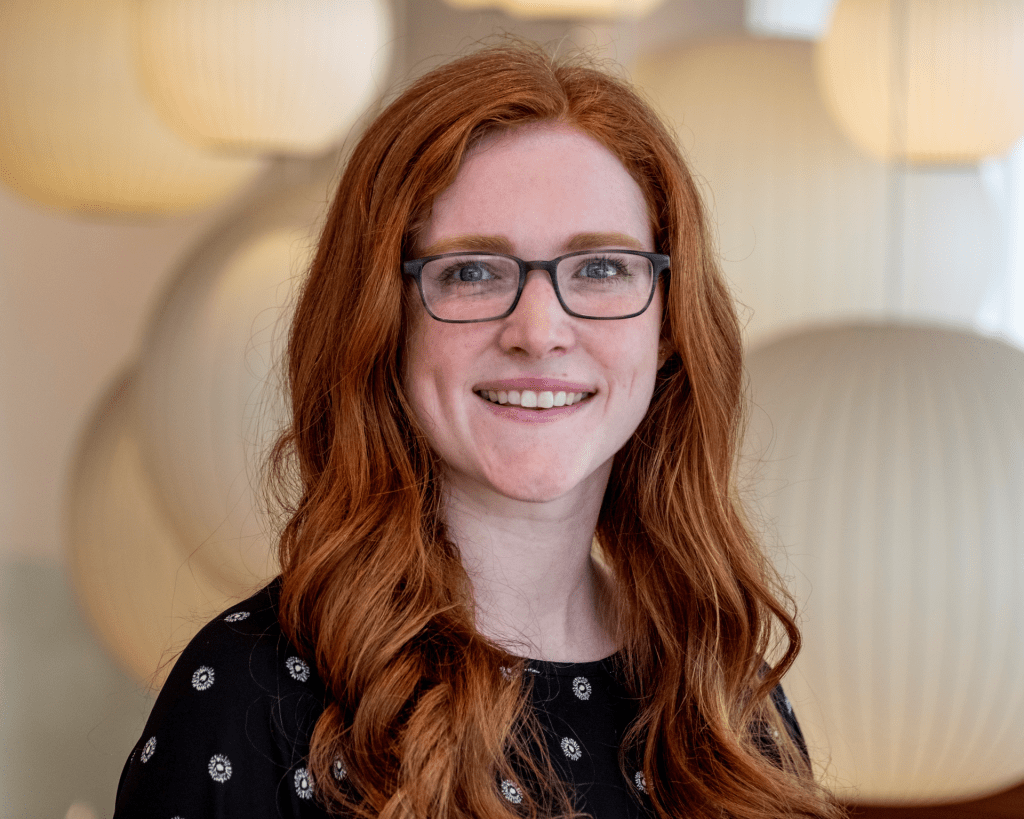
Speaker: Cara Nielson, Ph.D. candidate at University of Washington Neuroscience Graduate Program
Title: Pericyte Plasticity in Health and Disease
Description: Utilizing in vivo two-photon microscopy to study the mechanisms that control pericyte remodeling and the effects of cerebral amyloid angiopathy on pericyte growth
Fall 2023
Jointly hosted by WWU’s Behavioral Neuroscience Program and Biology Department. Wednesday, October 18th from 4-5pm in BI 234. Including student meet n’ greet before the talk.

Speaker: Dr. Aakanksha Singhvi, Assistant Professor, Fred Hutchinson Cancer Research Center
Title: Molecular heterogeneity and mechanisms of glial functions
Description: The two major cell types of our nervous system, glia and neurons, communicate constantly to enable neural functions, and disrupted glia-neuron interactions correlates with many neurological diseases. To identify these interactions mechanistically, we combine molecular-genetic/genomic studies with cellular imaging and animal behavior assays. Our work reveals novel pathways of glia-neuron interactions, including discovery of glial pruning in C. elegans. Conservation of all molecular players identified suggests broad biological and disease relevance.
Fall 2023
Behavioral Neuroscience Seminar Speaker -On Campus
Date: Tuesday, October 3rd from 4-5pm
Location: AW 204
Hosted by the Behavioral Neuroscience Program with coffee and cookies provided.
Speaker: Eric Winzenried, Ph.D. candidate at Washington State University Neuroscience Graduate Program
Title: Feeling Full: effects of diet on gut-brain signaling
Description: Our group investigates neurons in the nucleus of the solitary tract (NTS), which integrates signals about meal size and content coming from the gut, as well as overall metabolic state. It then transmits that information to other brain regions important for the control of food intake. My project focuses on characterizing a population of NTS neurons which express cholecystokinin and how their signaling may be altered by dietary choices. This work will add to our understanding of how gut-to-brain signaling works and how it is disrupted by metabolic disorders like obesity. AA/EO—For disability accommodations, please call 360-650-2148 or email BNS@wwu.edu.
Spring 2023
Brought to you by WWU’s Behavioral Neuroscience Program and Chemistry Department
Spring Quarter Seminar Speaker Dr. Amani Hariri on Friday, May 26th from 3:15pm-4:15pm in SL 130 and streamed live on Zoom. Register here to receive Zoom link. Includes an informal student meet and greet with Dr. Hariri after the talk until 5pm. Refreshments will be provided.
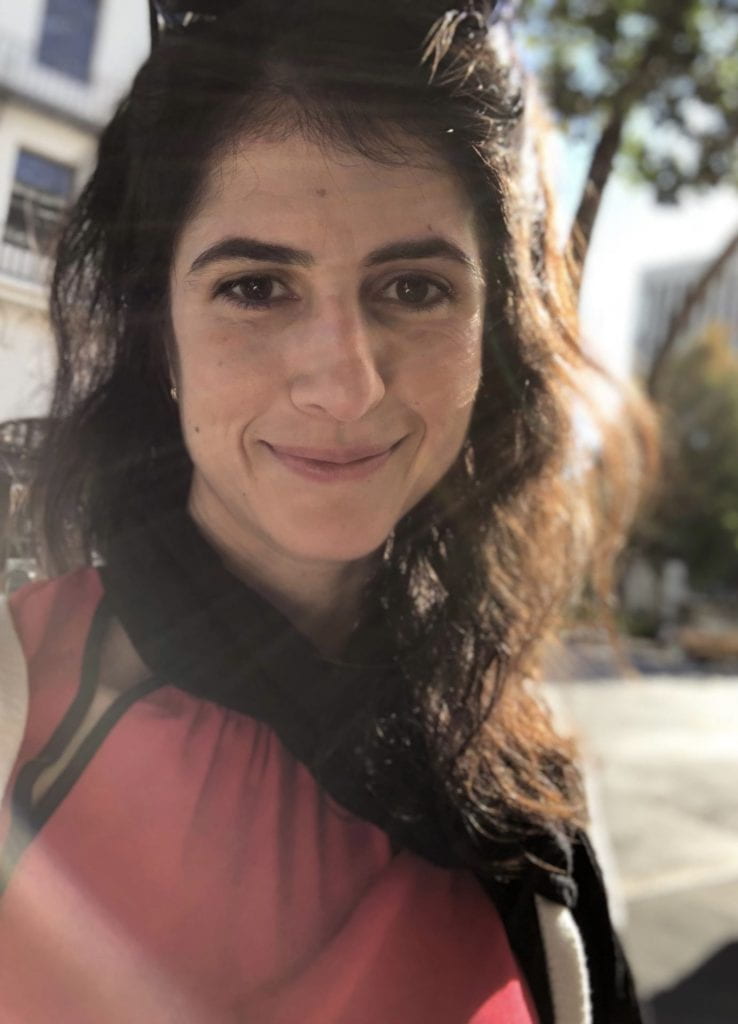
Speaker: Dr. Amani Hariri, Assistant Professor in the Department of Chemistry at the University of British Columba.
Talk Title: Optical Biosensors for the detection of neuromodulators in complex biomatrices
Talk Description: To gain a deeper understanding of neural circuitry and its effect on behavior and neurodegenerative diseases, we urgently need a sensor technology that can measure the communication among neurons – which is achieved through the release and uptake of neuromodulators (NMs) such as dopamine (DA), serotonin (5HT) and norepinephrine (NE). Unfortunately, the existing technologies for measuring neuromodulators are primitive. Currently, there is no method for measuring multiple neuromodulators with sufficient sensitivity, specificity, spatial resolution, and temporal resolution. If we could measure these signals in real-time, this technology would provide a “map” of how different neural circuitry controlled by different NMs operates together to govern behavior and disease. Here, we are developing a biosensor technology that will enable the simultaneous detection of major NMs in real time. Instead of relying on conventional electrochemical approaches, we are using structure-switching aptamer (synthetic antibodies) that change their conformation upon binding to specific neuromodulators and optically measure the binding signal using single photon detectors. In this presentation, I will describe our progress on developing this technology and discuss potential applications in neuroscience.
Winter 2023
Brought to you by WWU’s Behavioral Neuroscience Program and Psychology Department in partnership with WWU’s Alumni Association. Thursday 1/26/23 from 4-5PM -with informal student meet n’ greet 2:30-3:30pm in AW 302.
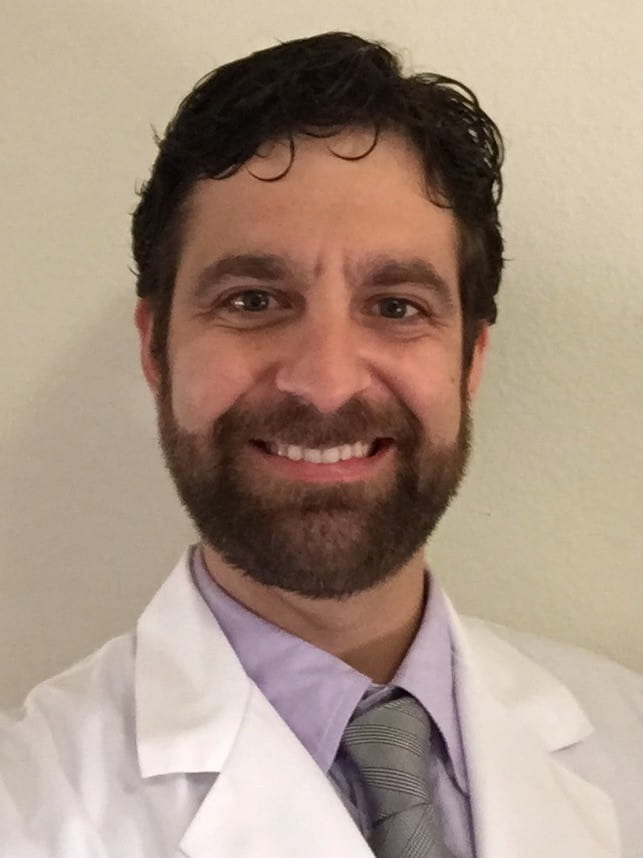
Speaker: Nathan Sackett, MD, MS, RN is trained as an addiction psychiatrist, focusing on the intersection between substance use and psychiatric disorders. He is faculty at the University of Washington in the Department of Psychiatry and Behavioral Sciences where he splits his time between seeing patients and research.
Title: Researching Psychedelics for Addiction: the Why, the What and the How
Description: This talk will introduce the theoretical background on the use of psychedelic compounds to target addiction. We will discuss some of the history and evidence for this work to help understand why this work is important. Additionally, we will discuss the development of a research center to further this work, discussing some of the challenges and opportunities involved with trying to develop a research center in an academic institution as a new faculty member.
Winter 2023
Brought to you by WWU’s Behavioral Neuroscience Program and Students for Sensible Drug Policy in partnership with WWU’s Alumni Association. Thursday 1/24/23 from 4-5PM in AW 204.

Speaker: Kathryn Tucker, JD Director of Advocacy at the National Psychedelics Association
Talk title: Increasing access to psychedelic medicines; why state legalization is not enough.
Description: States have begun legalizing access to various psychedelic substances, hoping to realize the benefits of therapeutic use to relieve a variety of mental health challenges. However, these substances remain prohibited under federal law. How can federal safe harbor be established? What efforts are underway to establish federal safe harbor? This discussion will be led by Kathryn Tucker, Director of Advocacy, National Psychedelics Association, founding board member of the Psychedelic Bar Association, counsel to Petitioners in AIMS et al v DEA. Tucker will review the emergence of state legalization and ongoing federal reform efforts.
Fall 2022
Behavioral Neuroscience Program Seminar Speaker

Speaker: Randall Eck, Ph.D. candidate University of Washington Neuroscience Graduate Program
Talk title: Identifying new regulators of neurodegenerative disease by forward genetics in C. elegans.
Description: By studying the molecular mechanisms of neurodegenerative disease, researchers can learn about basic biological processes and identify therapeutic targets for future treatment. Randall models Alzheimer’s disease and ALS using the worm C. elegans, leveraging its easy-to-work with genetics and other advantages to quickly uncover previously unknown regulators and mechanisms of neurodegeneration in these neurodegenerative diseases.
Date: Tuesday, October 18th, 4 – 5 PM
Location: AW 210
Fall 2022
Joint Behavioral Neuroscience Program and Biology Department Seminar Speaker
Title: The mosaic human brain: how advances in genetic technologies help children with epilepsy and neurodevelopmental issues
Description: Developmental brain disorders (DBDs) are a common cause of neurodevelopmental co-morbidities in children including epilepsy, intellectual disability, autism and others. For many years, the causes of these disorders were unknown. With the advent of advanced genetic methods, our understanding of the molecular causes of DBDs has expanded substantially with an increasing number of causal genes and pathways identified. These genetic advances coupled with more efficient testing modalities help families living with these disorders in many ways including earlier diagnosis, better counseling, and more targeted medical management.

Presented by: Dr. Ghayda Mirzaa, MD, Associate Professor at UW Medicine & Co-director of Molecular Diagnostic Laboratory
When: Wednesday, October 12th 2022 from 4-5 PM
Location: BI 234 and via Zoom
Meeting ID: 980 8035 1166
Passcode: 377803
Spring 2022
Title: The Abuse Potential of Oxymorphone: Lessons learned from two clinical laboratory studies
Presented by: Jermaine Jones, Ph.D. Associate Professor, Clinical Neuroscience, Department of Psychiatry, Columbia University

When: Tuesday, April 19th, 4 – 5 PM
Zoom Link: bit.ly/3inBS95 and group viewing in AW 412
Winter 2022
Title: Adaptive Deep Brain Stimulation: Clinical Bidirectional Neuroprosthetics
Presented by: Jeffrey Herron, Ph.D., Assistant Professor, Department of Neurological Surgery, UW Medicine
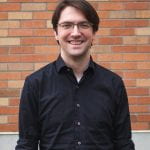
When: February 24th from 4 to 5 p.m.
Zoom Link: https://bit.ly/3qJDBuC
Description: The use of deep brain stimulation (DBS) to improve the treatment of those with neurological movement disorders represents a critical success story in the development of invasive neurotechnology and the promise of brain-computer interfaces (BCI) to improve the lives of those suffering from incurable neurological disorders. In the last decade, investigational devices capable of recording and streaming neural activity from chronically implanted therapeutic electrodes have supercharged research into clinical applications of BCI, paving the way for developing bi-directional neural protheses for in-human studies investigating the use of adaptive stimulation algorithms to further enhance therapeutic outcomes and improve future device performance. In this talk, Dr. Herron will review ongoing clinical research efforts in the field of adaptive DBS systems and algorithms. This will include an overview of DBS in current clinical practice, the development of bidirectional clinical-use research platforms, ongoing algorithm evaluation efforts, a discussion of current adoption barriers to be addressed in future work.
WWU is an equal opportunity institution. For disability accommodation, please contact Andrea Swanson, 360-650-2148, bns@wwu.edu
Fall 2021
Title: Friend or Foe? The role of glia in neurodegeneration in a C. elegans model of Parkinson’s disease.
Presented By: German Rojas, Ph.D. Student at UW’s Neuroscience Graduate Program
Description: Glia make up roughly half of the cells in the central nervous system, and they play important roles in the development and maintenance of the nervous system, both in health and disease. Parkinson’s disease, the second most common neurodegenerative disease, is characterized by debilitating motor and cognitive impairments resulting from the degeneration of specific midbrain dopamine neurons. There are both genetic and environmental risk factors that contribute to the development of Parkinsons, but there is no singular cause of the disease. Recent work has highlighted the potential role of glia in Parkinson’s disease, but exactly how glia may contribute to Parkinson’s disease remains unknown. My talk will present data that suggests glia may have both a harmful and beneficial role: while they may be important for clearing away degenerating neurons, they may also make dopamine neurons more susceptible to degeneration.
When: Tuesday, November 9th from 4:00 p.m. to 5:00 p.m.
Zoom Link: https://bit.ly/312v4Iz
Fall 2021
Title: Targeted Ndufs4 KO in PV interneurons is sufficient to produce a mild LS-related
epilepsy phenotype in mice.
Presented By: Arena Manning, Ph.D. Student at UW’s Neuroscience Graduate Program
Description: Leigh syndrome (LS), an epileptic encephalomyopathy, is the most common type of
infantile mitochondrial disorder. As a progressive mitochondrial disorder, LS has been
associated with a high rate of premature death where most affected children do not
survive past three years old. Like other mitochondrial disorders, clinical manifestations
involve multiple organs, however, brain-related symptoms such as drug-resistant
epilepsy are recognized as playing a central role in prognosis. LS is commonly caused
by recessive, loss-of-function mutations in genes that encode for proteins within
complex I (CI) of the mitochondrial electron transport chain. Researchers have focused
on the gene NADH dehydrogenase (ubiquinone) iron sulfur protein 4 (NDUFS4) as it
has been highly associated with causing LS. Recently, the Kalume Lab has shown that
restricting Ndufs4 KO to only GABAergic interneurons leads to a severe epilepsy
phenotype. The goal of my research is to investigate the relative vulnerability of
parvalbumin (PV) and somatostatin (SST)-expressing interneurons to the Ndufs4 KO
and elucidate its impact on the onset, progression, and severity of epileptic seizures.
With no currently available effective treatment, this research may help lead to the
development of effective and targeted therapy for LS-related epilepsy.
When: Tuesday, October 26th from 4:00 p.m. to 5:00 p.m.
Zoom Link: https://bit.ly/3lHnnj3
Spring 2021
Title: Automated behavioral testing and drug treatment in mouse models of Huntington’s disease
Presented by: Cameron Woodard, Postdoctoral Fellow at University of British Columbia working in Dr. Lynn Raymond’s lab
Watch recording: https://youtu.be/x_3aE5ba50U
When: May 4th from 4 to 5 p.m.
Winter 2021
Title: Acquired dysregulation of dopamine homeostasis reproduces features of Parkinson’s disease
Presented by: Meghan Bucher, Postdoctoral Research Scientist at Columbia University, Department of Environmental Health Science
Watch recording: https://youtu.be/DqHodFPYd2Y
When: Tuesday, February 16 from 4 to 5 p.m.
Zoom Link: http://bit.ly/BNSBucherSeminar
Description: Parkinson’s disease, the second most commonly occurring neurodegenerative disease, is characterized by debilitating motor deficits resulting from the degeneration of midbrain dopamine neurons. While there is no singular cause of Parkinson’s disease, it is known that both genetic and environmental factors contribute to disease risk. What remains unknown is what makes the midbrain dopamine neurons susceptible to degeneration when other neuronal populations are unaffected. This seminar presents data demonstrating that the dysregulation of dopamine homeostasis is sufficient to reproduce pathogenic mechanisms seen in Parkinson’s disease, suggesting that dopamine itself contributes to the vulnerability of these neurons to degeneration.
Fall 2020
Upcoming visiting seminar speakers and graduate school talk
Thinking About Graduate School Talk by Kyle Shea, Neuroscience Graduate Program advisor at University of Washington.
When: Thursday, October 8th from 4:00 p.m. to 5:00 p.m.
Zoom: bit.ly/GradTalkBNS
ATTEND A ZOOM PRESENTATION WITH THE ADVISOR FROM THE UNIVERSITY OF WASHINGTON NEUROSCIENCE GRADUATE PROGRAM
Join us Thursday, October 8 from 4 to 5 p.m. to discuss the graduate school application, graduate school life, and specific information about the University of Washington (UW) graduate program. This virtual event is presented by Kyle Shea, graduate school advisor at UW. All are welcome.
Zoom: bit.ly/GradTalkBNS
AA/EO—For disability accommodations, please call 360-650-2148 or email
BNS@wwu.edu.
__________________________________________________________________________________________________________________
When: Tuesday, October 13th from 4:00 p.m. to 5:00 p.m.
Zoom: https://bit.ly/BNSLeeSeminar
When: Thursday, October 22nd from 4:00 p.m. to 5:00 p.m.
Zoom:https://bit.ly/BNSElumSeminar
Winter 2020
Neural Substrates of Binge Drinking, a BNS Seminar by Dr. Angela Ozburn at Oregon Health & Science University.
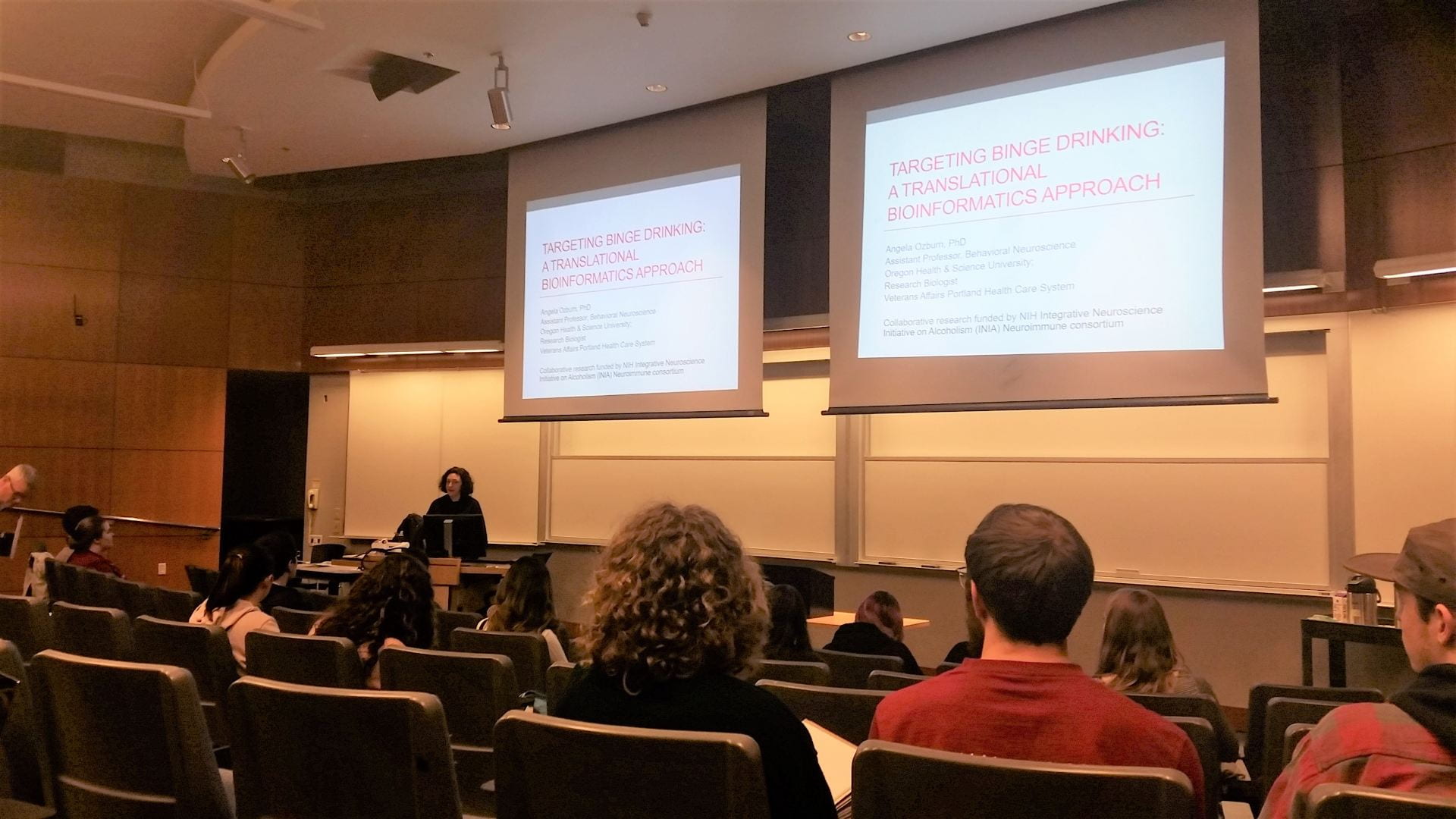
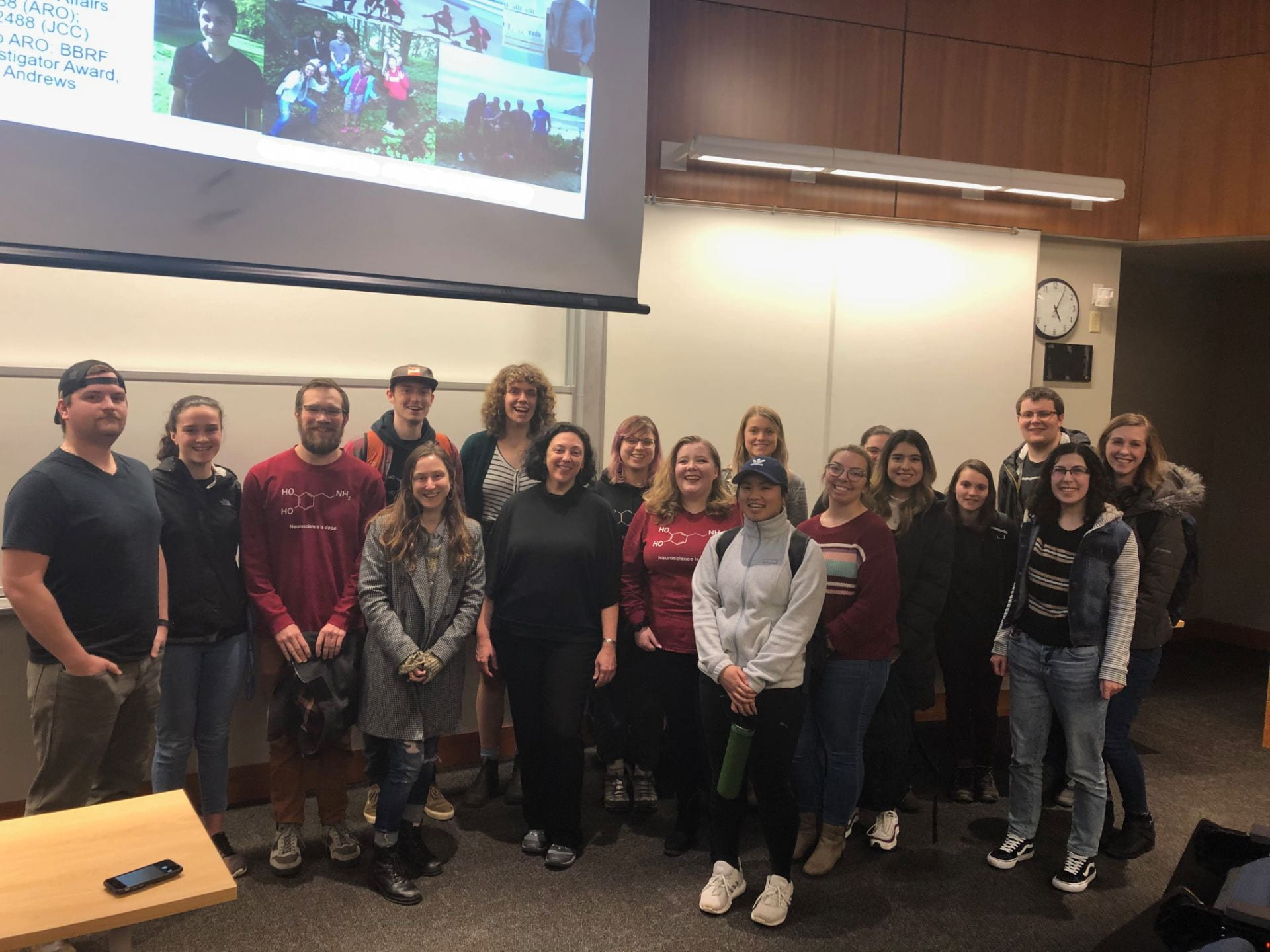
January 28, 2020| 4:00 pm – 5:00 pm
Title: Neural Substrates of Binge Drinking
The goal of these studies is to identify how altering specific brain activity can reduce binge-like alcohol drinking in mice.
__________________________________________________________________________________________________________________
Fall 2019
“Dopamine and Neuropeptide Regulation of Drug Taking”, a BNS Seminar by Ryan Farero at University of Washington.
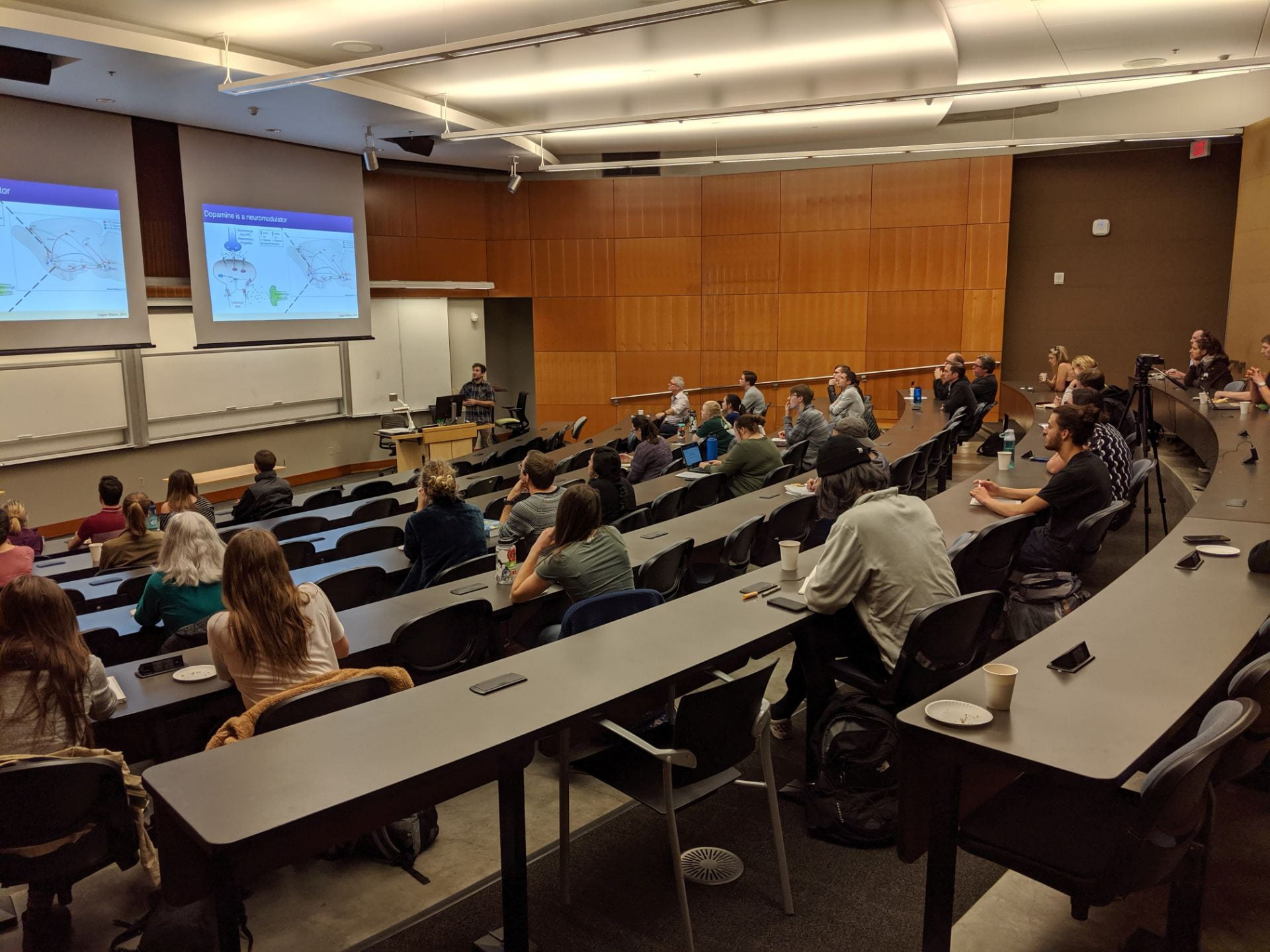
Ryan is a PhD Candidate in the Neuroscience Graduate Program at University of Washington studying the neurobiology of drug addiction. Ryan will discuss research on the biological mechanisms promoting aberrant dopamine transmission and the associated behavioral outcomes observed in animal models of drug addiction.
__________________________________________________________________________________________________________________
Winter 2019
“Sex Differences in Reinforcement: Role of Environmental Enrichment and the Orbitofrontal Cortex”, a Psychology Department seminar by Dr. Jeff Grimm.
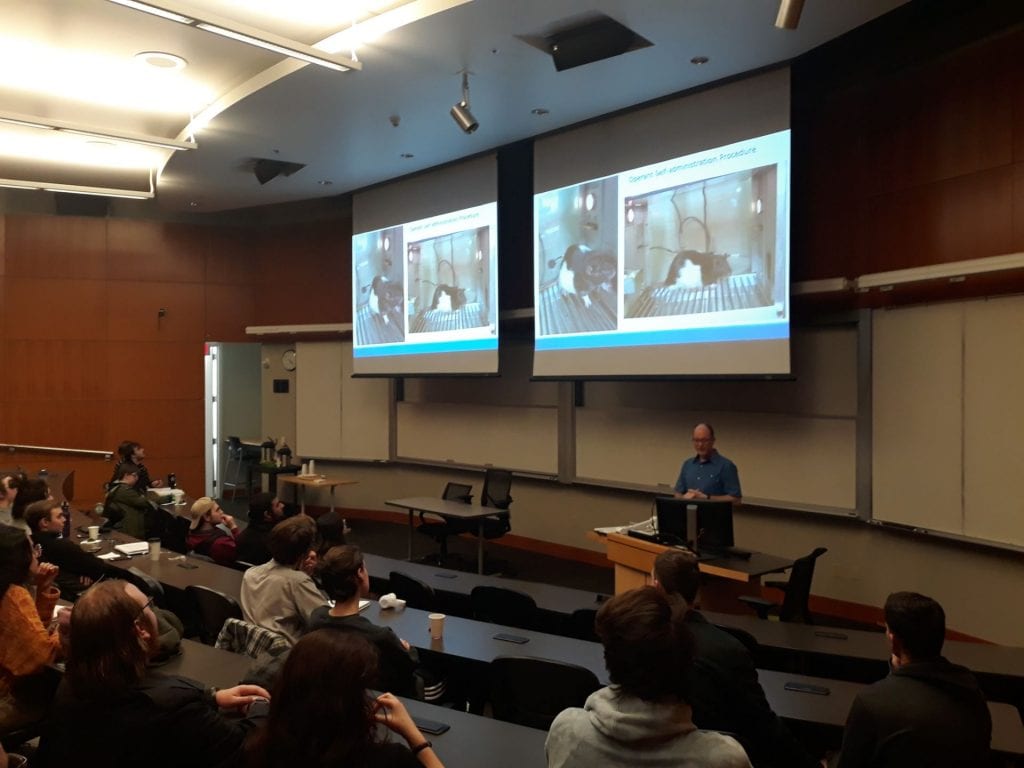
3/7/19 Dr. Jeff Grimm gives Psychology Department Sabbatical Lecture to WWU students
Dr. Jeff Grimm, professor of Behavioral Neuroscience at Western Washington University presented, “Sex Differences in Reinforcement: Role of Environmental Enrichment and the Orbitofrontal Cortex” on Thursday, March 7, 2019.
Dr. Jeff Grimm’s lab investigates the neurobiology of relapse. With the collaboration of student laboratory assistants, he is conducting experiments to identify
brain areas involved in relapse. For more information please visit Dr. Jeff Grimm’s research lab website.
__________________________________________________________________________________________________________________
Winter 2019
“Cracking the Cannabis Code”, a BNS Seminar by Dr. Josh Kaplan

Dr. Josh Kaplan is a new faculty member in the Behavioral Neuroscience program at Western Washington University. Dr. Kaplan will lecture on the developmental consequences and therapeutic efficacy of cannabis, and provide an overview of his lab’s focus. The event will be held in the Academic Instructional Center West 204. Everyone is welcome. For more information please visit Dr. Josh Kaplan’s research lab website.
__________________________________________________________________________________________________________________
Fall 2018
“Individual differences in language and rhythm skills: a journey from behavior to brain to genetics”
Dr. Gordon’s research examines the relationship between rhythm and grammar skills in typical development and specific language impairment, the neural mechanisms underlying rhythm and grammar skills, the genetics of language disorders, and how musical training can improve language skills. This talk will be held Nov. 5 at 3 p.m. in MH 152.
“Exploring Huntingtin’s Nuclear Roles” Neuroscience Seminar
Dr. Carroll will discuss how his lab’s new work is aimed at understanding the roles played by the Huntingtin protein in the nucleus, and how these roles may be perturbed to cause Huntington’s Disease. Dr. Carroll’s presentation will be held in BI 234, at 4:00 PM on October 24th.
Behavioral Neuroscience Guest Speaker
Kevin Hope is a WWU BNS graduate, PhD Candidate, and Graduate Research Assistant in the Department of Neurology at the University of Tennessee Health Science Center. Kevin will present mechanisms for seizures involved in Duplication 15q syndrome, a human neurodevelopmental disorder, using the Drosophila melanogaster model organism. His presentation will be held in BIO 234.
